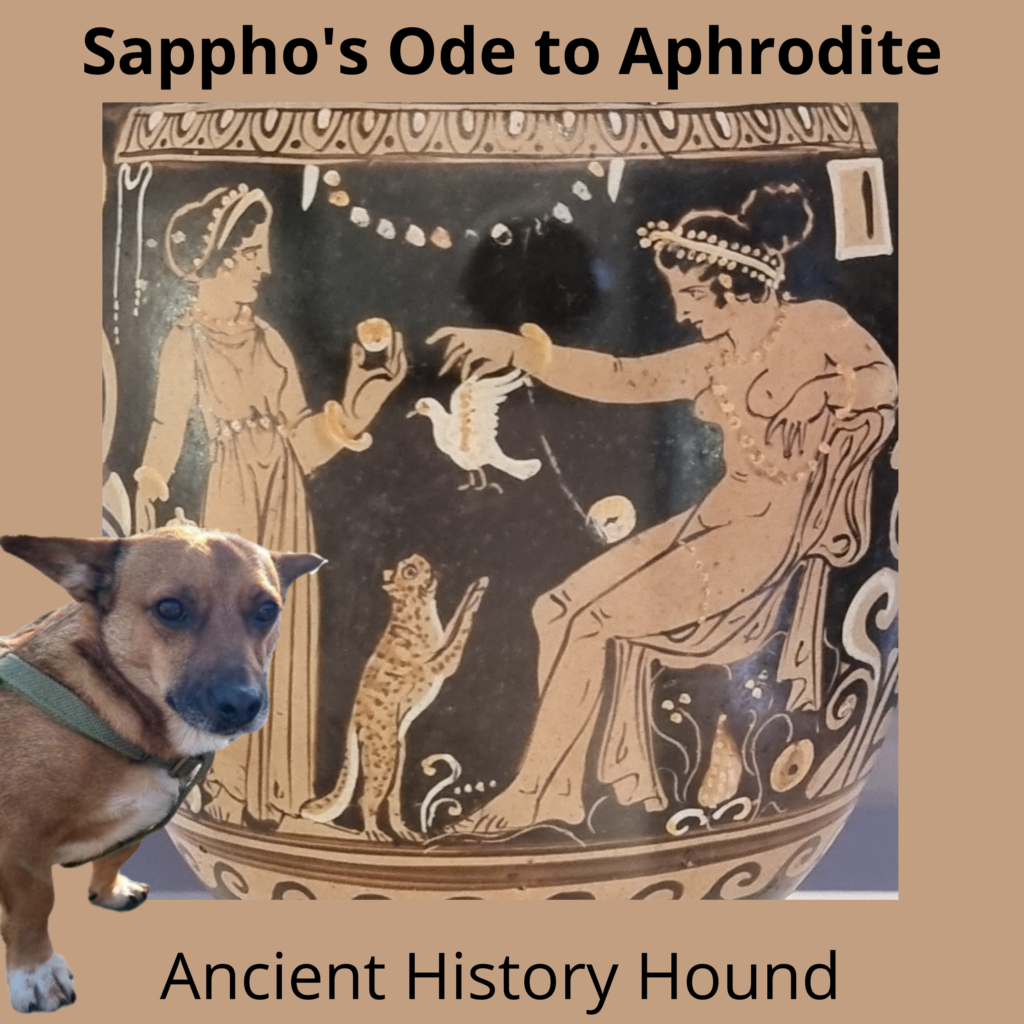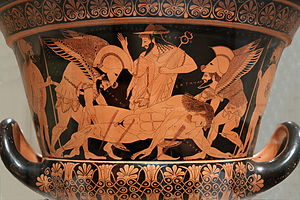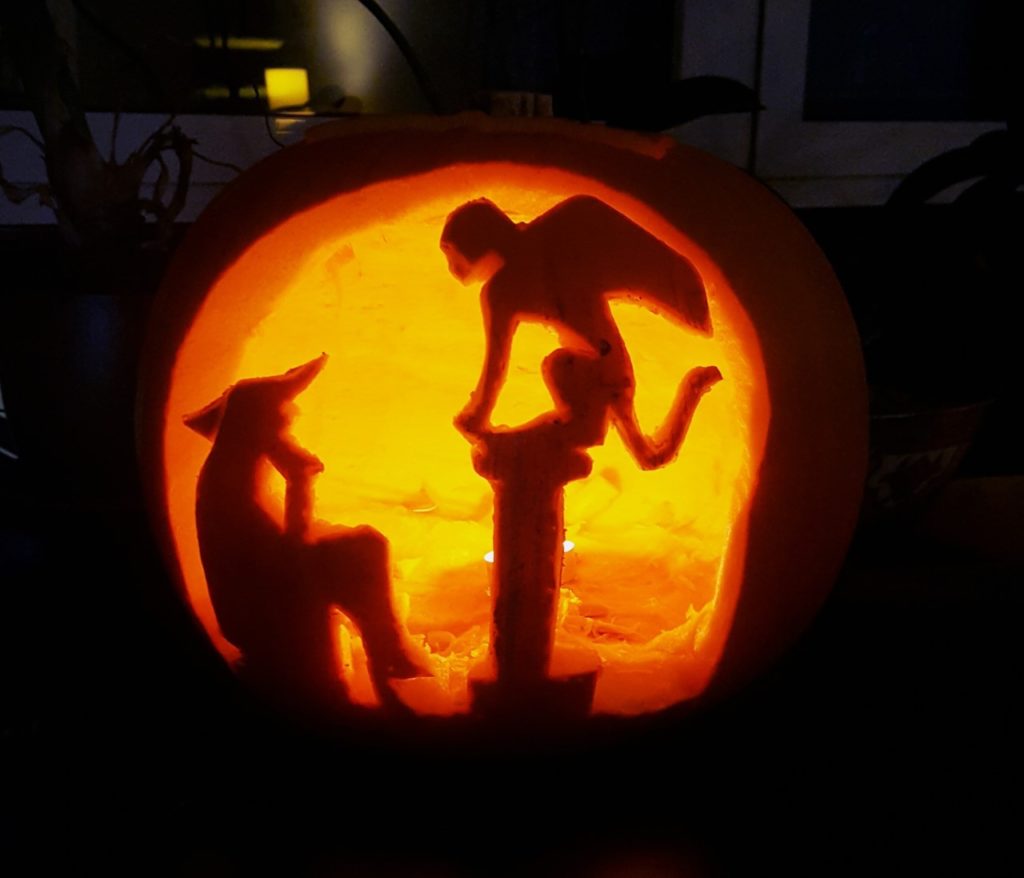Sappho – a few extra bits.
I hope you enjoyed the episode on Sappho and it was truly fab to have a recording of her work being sung.
I’d normally put a link here but my new website (yes, I did mention it a bit) has a player embedded but if you ever have trouble finding a link to one of my episodes just contact me!
Seikilo.
Many thanks to Seikilo who gave me permission to use the audio in the episode. If you wanted to watch the video (and why not?) Here it is below.
Check out the channel and in case you can’t find it here it is below.
You can also find them on Instagram.
Sappho’s Ode to Aphrodite.
I’ve included the poem in the transcription. Translations vary but here’s the one I used.
Deathless Aphrodite of dazzling throne,
Beguiling enchantress, child of Zeus, do not
I beseech you, overwhelm my soul with torment
And anguish, O queen,
But come here to me, if ever before
You heard from afar my voice and listened to me,
And, abandoning your father’s golden home,
You came to me,
Your chariot yoked, and your sparrows pretty and swift,
With frequent pulsing of fluttering wings bore you
Athwart the black earth, sheer from above,
Through heaven’s mist
And quickly they came, and you, O blessed one,
With a smile upon your immortal face, asked
Whatever I suffered now and why again
I called on you
And whatever I most in my maddened heart wanted
To happen to me “whom I am now to persuade to lead you back to her love? Who, O Sappho, does you wrong”
For if she flees, she’ll soon pursue, and if she refuses gifts, she’ll soon bestow them.
And if she does not love, soon she will,
In her despite”
Come to me even now and release me
From torturing cares, and all that my heart
Desires, accomplish for me, and do you yourself
Do battle with me.
Further Reading/ sources used.
Homer, Iliad.
Pindar, Pythian IV.
Ankarloo & Clark, Witchcraft and Magic in Europe.
B Hughes Fowler, Archaic Greek Poetry.
James Davidson, The Greeks and Greek Love.
Faraone & Obbink, Magika Hiera.
E Pachoumi, The Erotic and Separation Spells of the Magical Papyri and Defixiones.
C Faraone, Ancient Greek Love Magic.
Transcription.
Sappho’s Ode to Aphrodite is both a rare and incredible work. But what are some of the themes, what’s the premise of the poem and what would it sound like perfomed in ancient Greek. Well, join me and find out all about it on a special mini episode of the ancient history hound podcast..
Hi and welcome to the ancient history hound podcast. My name’s Neil. I’ve been doing this podcast for almost 5 years and so I thought I’d try something new, an occasional shorter episode which allows me to focus on something which might not be suited for a longer episode.
So the first short episode is on Sappho’s Ode to Aphrodite. This was something which I used in my MA dissertation many, many years ago. Just so you know there will be episode notes on my new and improved website ancientblogger.com. What you can expect is a brief overview of Sappho, some of the elements of the poem and even a performance of it in ancient Greek. Not by me I hasten to add but by the fantastic people at Say-kill-us, they are all about ancient Greek music. Links to their Youtube channel where they showcase music played on ancient Greek instruments will feature in the episode notes on the new and improved ancientblogger.com website.
Here we go then, to start with who was Sappho?
Sappho will at some point get her own episode, because she is one of the great figures from antiquity. She was born in the late 7th century BCE to a well-set family on the island of Lesbos. She wrote large amounts of poetry, sadly little of it survives in fact one estimate is that we only have 1% of her work. But back in antiquity she was recognised as a great artist, a great person.
An important point about poetry in ancient Greece is often missed. It was performed. Where we think of poetry as experienced primarily in a book the works of Sappho would have been sung with accompanying music. It was a work of art on so many different levels.
Lesbos is an island which hugs the coastline of modern day Turkey, so Sappho wasn’t from mainland Greece and this was reflected in her accent. The three dialects of ancient Greece at the time were Ionic, Doric and Aeolic. It was Aeolic which Sappho spoke and this gave her work a strong accent differing from the other two. In fact it was an element which could make her poetry difficult to understand for both Greeks and later cultures.
And then there’s the other thing Sappho was closely associated with, a woman’s love for another woman. Lesbos and Sappho gave rise to the modern words lesbian and Sapphic. And yet what we know about Sappho is miniscule. Perhaps, well, hopefully, more fragments will come to light or perhaps even an entire poem. Because, trust me she’s absolutely fascinating.
Next up – the poem and I’m going to read it out but don’t forget that performance of it at the end of the episode. I’m using the translation by Barbara Hughes Fowler in the book Archaic Greek Poetry which is a great sourcebook by the way. There is a point in the second half of the poem where Aphrodite addresses Sappho directly, ideally I’d have a second voice but just listen out for it.
Deathless Aphrodite of dazzling throne,
Beguiling enchantress, child of Zeus, do not
I beseech you, overwhelm my soul with torment
And anguish, O queen,
But come here to me, if ever before
You heard from afar my voice and listened to me,
And, abandoning your father’s golden home,
You came to me,
Your chariot yoked, and your sparrows pretty and swift,
With frequent pulsing of fluttering wings bore you
Athwart the black earth, sheer from above,
Through heaven’s mist
And quickly they came, and you, O blessed one,
With a smile upon your immortal face, asked
Whatever I suffered now and why again
I called on you
And whatever I most in my maddened heart wanted
To happen to me “whom I am now to persuade to lead you back to her love? Who, O Sappho, does you wrong”
For if she flees, she’ll soon pursue, and if she refuses gifts, she’ll soon bestow them.
And if she does not love, soon she will,
In her despite”
Come to me even now and release me
From torturing cares, and all that my heart
Desires, accomplish for me, and do you yourself
Do battle with me.
The general premise of the poem is that Sappho is infatuated with someone and requests help from Aphrodite. Sappho makes mention of where the goddess has helped her in similar situations in the past and the poem finishes with her asking for Aphrodite to work with her in all that her heart desires, and this might mean more than freeing her of her current infatuation. That Aphrodite names Sappho is itself a rare thing and builds on the connection between the two. How this is framed is vital as I’ll mention but I’ll start with the humourous elements of it all which has been noted by many scholars. Perhaps a surprise given the subject.
Sappho reminisces about her previous experiences of working with the goddess to achieve her hearts desire. And the goddess asks her who it is that she needs help with. A perfectly reasonable query, but it comes across in a manner of Aphrodite almost rolling her immortal eyes. Ok Sappho, who is it this time.
And there’s also humour to be found at the outset. How does Aphrodite arrive, not by appearing or flying but in a chariot. Ok, you might say, it’s impressive. But less so when it’s drawn by sparrows. Again there’s opinion that the juxtaposition of sparrows pulling a chariot is itself a bit of a joke, it feels a bit Monty Python. Not only are sparrows hardly a grand animal but in terms of how it would function, they aren’t exactly animals which would pull in the same direction, and how are they attached exactly? Now sparrows weren’t chose randomly they were a bird associated with the goddess. But just not ones you’d necessarily want pulling you along.
In fact we can take the chariot as the literal comedy vehicle to consider a joke outside of the poem. The instance of Aphrodite getting on her chariot and speeding to Sappho has been argued as a parody of a journey Hera makes in the Iliad. In book 5 she travelled from Olympus to the plains of Troy in a chariot drawn by horses and Homer paints a dynamic scene of Hera cracking the whip and the horses neighing as they sped to the earth. It’s perhaps more what you might expect.
If this is a reference it’s ingenious because it extends further. Linking Aphrodite to the Iliad provides a bit of a cruel joke at Aphrodite’s expense. The goddess doesn’t fare well in the Iliad where warfare is involved and if you’re thinking, hang on no-one’s saying that, well, the chariot was a part of the battlefield iconography of Homer. So let’s sum up – we have Aphrodite, a goddess with proven poor track record in warfare choosing to ride in a chariot. That sparrows are involved gives a comically visual image and there’s the idea that it’s made more ridiculous by having an example of Hera travelling in a chariot to contrast it with.
Moving on from humour how Aphrodite is referred to is also crucial to the poem. In the opening stanza she’s called the daughter of Zeus. In mythology Aphrodite had two origin or birth myths. One is perhaps more famous than the other and both offer comment about her. In one myth Aphrodite emerges from the foam caused when the castrated genitals of Uranus fell into the sea. In the other she’s simply the daughter of Zeus and Dione. Sappho uses the latter, perhaps the more civilised and gentler form of Aphrodite because she had something of a fearsome side. Greek gods could have particular aspects or elements appealed to invoked. You may have noticed that often an epithet follows the name of a god. It was always crucial to get this right.
This moves into a further comment on the poem, that it was formed of three sections. The initial appeal to Aphrodite, the reminder of past experiences together which supported the request and the demand which is made at the end. Here we have a poem acting in a more formalised appeal and in a way which has been seen in the later tradition of love spells.
Love spells became almost an established practice through Classical Greece and in the later periods. Potions and amulets might help but also an incantation or type of prayer and Aphrodite was exactly who you might turn to. In the Iliad Aphrodite helps Hera seduce Zeus and later, in the 5th century BCE, we have Pindar giving an account of Aphrodite helping mortals. Here it’s Jason of Argonaut fame looking to win the affections of Medea. He does so and Pindar wrote how this was achieved using incantations he was taught by Aphrodite.
But love wasn’t an easy thing, in fact Sappho in another poem described it in a manner similar to an illness or disease, as a fire running under the skin. For the ancient Greeks love wasn’t something taken lightly, and in this poem Sappho mentioned her ‘maddened heart’ and ‘tortuous cares’. This motif of suffering is something present in love spells and also how Aphrodite facilitated an outcome. Take a charm she used which consisted of a bird tied to a wheel – it doesn’t sound pleasant and it’s been posited that this carried the notion of being both caught and in a frenzied state. Emotional and physical distress formed the palette of many love spells, either in the creation or dispelling of this intense desire.
A particular type of spell relevant here was the agoge, which sought to drive the person into your arms. A spell similar to this was the binding spell which was used for different, more pernicious reasons but they were similar in that they tried to bind an individual to an outcome or fate. There isn’t the sense that the other person has a say in the matter but then as I said affairs of the heart could wander into very nasty or uncomfortable territory in ancient Greece. Little wonder that the poem ends the Sappho asking Aphrodite to do battle with her and perhaps this is a military analogy isn’t part of that comic
And speaking of the end, here we are but what a way to sign off. What you are about to hear is a rendition of the poem in ancient Greek by Evangelia Thalassini courtesy of Say-kill-o. They have a fantastic Youtube channel where music is played using ancient instruments. My favourite, the Star Wars theme is something else. Now, don’t worry if you didn’t write that down. I’ll put the clip and links to it all in the episode notes on my website ancientblogger.com.
Well, thanks and I’d appreciate any feedback you have. You know where to find me and if not my updated website, forgot to mention that, has all the links. So, take it away Evangelia.



